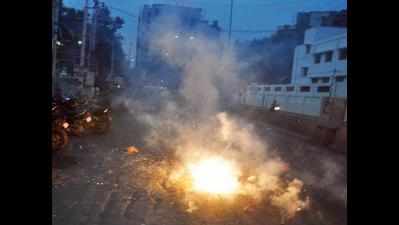- News
- City News
- lucknow News
- Don't let smoke, sound, burns spoil festive fun
Trending
This story is from October 28, 2016
Don't let smoke, sound, burns spoil festive fun
People suffering from asthma, bronchitis and other chronic obstructive pulmonary diseases (COPD) should take extra care of themselves during Diwali as experts say their medical condition can aggravate around the festival.

Lucknow: People suffering from asthma, bronchitis and other chronic obstructive pulmonary diseases (COPD) should take extra care of themselves during Diwali as experts say their medical condition can aggravate around the festival.
Last year around Diwali, the tiniest form of suspended air pollutant - PM 2.5- had seen an increase of 152% from the previous year, according to the ambient air quality report of Lucknow by Indian Institute of Toxicology Research Centre (IITR).Being small in size, PM 2.5 travels easily through the respiratory tract, sticking to the lungs, causing short term effects such as eye, nose, throat and lung irritation, coughing, sneezing, runny nose and shortness of breath, apart from worsening asthmatic and heart conditions.
Long term exposure causes increased rate of chronic bronchitis and reduced lung function. Heart patients should also take prevention.
"Season change with smoke in the air creates additional problems when the pollen and pollutants in air combine. Patients should not overdose or under-dose their medication and take expert help if breathing issues worsen," said Dr Ved Prakash of respiratory department of King George's Medical University (KGMU). Not just respiratory issues, ear, nose and throat (ENT) are also under threat from the high decibels of sound and air pollution. "Every year, there is an influx of 2-2.5% patients of acoustic trauma post-Diwali. Sound levels should be maintained around 80-85 decibels and with cracker noise at around 130 decibels, buzzing, irritation, dizziness, long term hearing impairment and other ear problems start. If not treated early, some might even become irreversible," cautioned ENT surgeon Dr Rakesh Srivastava.
"Night coughing is a phenomenon that increases during Diwali. Smoke adds to it and it is advisable to take an anti-allergic seven days prior and post-Diwali. If problem persists, nebulisers and inhalers should be used on prescription," added Dr Srivastava.
Last year around Diwali, the tiniest form of suspended air pollutant - PM 2.5- had seen an increase of 152% from the previous year, according to the ambient air quality report of Lucknow by Indian Institute of Toxicology Research Centre (IITR).Being small in size, PM 2.5 travels easily through the respiratory tract, sticking to the lungs, causing short term effects such as eye, nose, throat and lung irritation, coughing, sneezing, runny nose and shortness of breath, apart from worsening asthmatic and heart conditions.
Long term exposure causes increased rate of chronic bronchitis and reduced lung function. Heart patients should also take prevention.
"Season change with smoke in the air creates additional problems when the pollen and pollutants in air combine. Patients should not overdose or under-dose their medication and take expert help if breathing issues worsen," said Dr Ved Prakash of respiratory department of King George's Medical University (KGMU). Not just respiratory issues, ear, nose and throat (ENT) are also under threat from the high decibels of sound and air pollution. "Every year, there is an influx of 2-2.5% patients of acoustic trauma post-Diwali. Sound levels should be maintained around 80-85 decibels and with cracker noise at around 130 decibels, buzzing, irritation, dizziness, long term hearing impairment and other ear problems start. If not treated early, some might even become irreversible," cautioned ENT surgeon Dr Rakesh Srivastava.
Air pollution due to Diwali crackers also causes nasal problems like breathing difficulties and collection of fluid behind the ear that may lead to hearing loss. With respiratory issues, the heart is also at a higher risk and irritability, blood pressure and blood sugar rise.
"Night coughing is a phenomenon that increases during Diwali. Smoke adds to it and it is advisable to take an anti-allergic seven days prior and post-Diwali. If problem persists, nebulisers and inhalers should be used on prescription," added Dr Srivastava.
End of Article
FOLLOW US ON SOCIAL MEDIA










